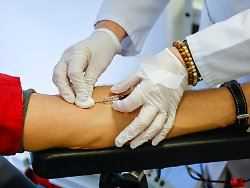Wednesday, December 29, 2021
Russians want to test foreigners
Berlin worried about compulsory examination
Russia will soon find out which foreigners living there are sexually ill or drug-ill. A new law by the Kremlin requires migrants living in the country to undergo medical examinations. Criticism comes from the USA and Germany.
With an internationally criticized law, Russia introduced mandatory medical examinations for Germans and other foreigners. This regulation came into force on Wednesday. The law signed by President Vladimir Putin therefore prescribes elaborate medical checks such as taking blood, x-rays or CT scans.
The US embassy criticized the law as “xenophobic”. The Russian government is making it more difficult for foreigners to stay in the country, embassy spokesman Jeson Reholz said on Twitter. The federal government in Berlin also expressed concerns. The regulation affects foreigners who stay in Russia for more than 90 days. Those who are in the country for work only have 30 days. They need to be screened for tuberculosis, drug use, syphilis and HIV, for example. Exceptions are diplomats, children under six years of age and people from Belarus. Fingerprints are therefore also mandatory.
After criticism from abroad, the Ministry of Health in Moscow informed the Interfax agency that the regulation should be changed. Tests should then be valid for one year. The German-Russian Chamber of Commerce Abroad (AHK) announced that they continue to hope for a softening of the law. The Association of Foreign Correspondents FCA in Moscow is also in talks with the authorities, according to its own information.
Business representatives warn of the consequences
Experts criticized the law as contradicting itself. There are still many unanswered questions. The chamber warned of the consequences for the Russian economy if the new regulation were actually implemented consistently. If business representatives are concerned, there is a risk that “foreign managers who are important to Russia will turn away from Russia on a large scale”. The chamber recently issued a letter asking the Russian government to weaken the law.
The concerns of the many organizations and companies active in Russia about the possible effects of these new regulations on economic, scientific and civil society cooperation with Russia are shared, said a spokeswoman for the German Foreign Office. “We will take up these concerns and of course continue to discuss them with the Russian authorities.”
The German Association of Journalists called on Foreign Minister Annalena Baerbock to stand up for German citizens. Vice-chairman Mika Beuster said: “The general state of health of foreign journalists is nothing to do with the Russian government.” Such forced investigations are completely disproportionate. Beuster also fears that the results of the investigation could be misused to expel critical media representatives.
Kremlin-critical newspaper speaks of “discrimination”
At the request of correspondents, the Russian Foreign Ministry in Moscow announced that it wanted to look into “favorable conditions” for media representatives and their families during the investigation. At first it was unclear what happens when someone is sick – whether those affected then have to leave the country.
The Kremlin-critical newspaper “Novaya Gazeta” asked in a report on the reform: “Is this about the health of society or is it discrimination?” The Russian authorities argue that the new procedure will improve the health situation in the largest country in the world in terms of area.
Foreigners from the EU, for example, fear not only possible treatment errors in view of the less well-equipped health system compared to the West, but also unnecessary radiation exposure from the planned X-ray examinations. It is also unclear how the compulsory examinations should be safely organized in view of the high level of pollution caused by the corona pandemic. In addition, data protection in Russia is considered to be full of holes. Time and again, large amounts of personal data are released into free circulation.
